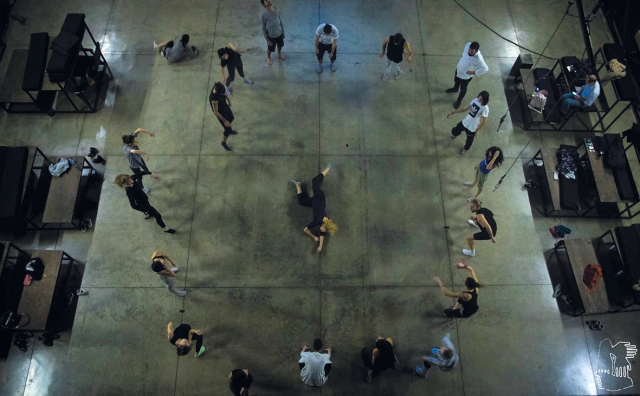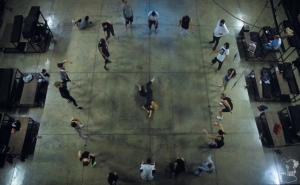Discover the Journey of the Georgian Tamada in Manhattan
Georgia is an interesting country, striving for development and following the latest world trends, yet maintaining the ancient traditions inherited from the previous generations. The notion of the feast table (Supra) and its ‘leader,’ a toastmaster, translated in Georgian as Tamada, certainly represents a symbol of the authenticity of Georgia. No gathering is imaginable without a Tamada, who is a sort of storyteller, who brings together the representatives of different generations, offers toasts on numerous themes in a beautiful, poetic way, revives old stories, and adds a sprinkle of uniqueness to each supra.
Georgian hospitality and customs of locals caught the eye of foreigners years ago, but the concept of Tamada seems to be the most interesting for the international audience. The upcoming premiere of the Broadway-style musical, named ‘Tamada in Manhattan’ and created by the American Director Paul Gordon Emerson in collaboration with the Embassy of the USA to Georgia, is the certainly the best proof of that.
GEORGIA TODAY met the cast to find out about the concept behind the intriguing title of the musical and its main messages for viewers.
We start with Abby Leithart, one of the choreographers and actors, asking for her views about ‘Tamada in Manhattan.’
“This project is really different compared to what we’ve done before,” she tells us. “In other plays I dance, but here I’m to take to the stage as a singer. It’s been a diverse yet fun experience. I’ve no doubt the musical will be interesting and exciting to watch.”
We ask Abby about her opinion of combining the traditions of two completely different countries.
“It’s very interesting to see how they [traditions] come together, as even though they are very dissimilar, they still can work and co-exist. It has been equally fascinating to see the process of the creation of the show with such a concept and how a Tamada finds himself in New York,” she says.
The director, Paul Gordon Emerson, joins our conversation, so we ask him why he decided to move a Georgian Tamada to the US and what the source of his inspiration was for the musical.
“There are multiple parts to what was inspiring about this project,” he answers. “For a long time, Georgians and Americans were in very different parts of a political system and I’m not sure whether these peoples know each other well enough. Sometimes, you think that there are big divides between people and anytime you visit them together you always discover that they are the same in an incredible number of ways.”
The director goes on to emphasize the crucial importance of the notion of family in Georgia, which was the first thing that “struck” him, and noted that family is equally powerful in the US. “The United States is at its heart all about the family. And how much that’s the same here caught my attention,” he states.
“We don’t have a toastmaster tradition,” Emerson continues. “Tamada is a unique idea. But what is very familiar is the idea of the storyteller and the idea that the Tamada shares stories about various themes, including elder generations, heroes, God and more. Thus you begin to understand that a Tamada could be very much at the dinner table in the US.”
While discussing the upcoming premiere, it becomes obvious that Emerson has gone beyond the frames of offering the audience simply something unorthodox with the elements of a wonderful show: Tamada in Manhattan is definitely much deeper in context.
The director tells us that alongside the constantly evolving country, the concept of Tamada also experiences particular shifts. “In order to share the Tamada’s experience from an American perspective, but make it relatable to the home, we decided to simply ‘parachute’ him into Manhattan. There is no logic to how the protagonist finds himself in 1970s New York: how he gets there and why he gets there is a complete mystery.”
The melodies represent the main lead of the musical and Emerson chose the pieces with very profound and interesting connotations.
“We built the structure of the entire story around iconic American songs from the 1960s and an impressive number of them are about the concept of change. And while working on the project, we aspired to give the Tamada a journey, using these pieces and stories to build his toasts,” the Director says, spotlighting the diverse scenes of the conflict between generations and the love story the viewers will discover in the play. “As his journey moves along, ultimately it seems that everything is fractured, but through him, as a toastmaster and head of the supra, he brings everyone back together.”
“We hope that we will honor the traditions here, honor our families back home, and I hope that through this great music, people will celebrate a way to understand that we may live oceans apart, but we are really the same people and that at the end of the day we are strong because of our families,” Emerson adds.
Why a Tamada, we ask.
“For an American, this character is fascinating. I was jealous of the idea of having someone like that at home, who is a gatherer of traditions. He is a sort of historian. Minors at a feast table learn so much about their families, culture, customs and traditions through the stories of the Tamada, and this is extremely powerful.”
“This theater is unique for dramatic as well as aerial work,” he adds. “Fantasy is a reality and oral history is a visual history here. At the Movement Theater, they do not talk. The Tamada is a talker, though, and his words make up an image. To try to mix the tradition that is about language and the theater, that is about movement, was an absolutely fascinating and stunning experience.”
Regardless of the high respect of Georgians and Americans towards their families, sometimes it can be a little boring for youngsters to spend hours with the representatives of elder generations and listen to dusty old stories. So, we ask Paul if there are any particular messages in Tamada in Manhattan that would help the young generation to revise their outlook in this regards.
“It is a huge challenge,” he tells us, revealing a secret that will catch the attention of minors in particular. “Hopefully, we will have the guest appearance of a Spiderman in the play. In addition, children have extraordinary imagination and ability to live beyond a specific moment. And these kinds of experiences at theaters are always about living outside the immediate visual. We hope all the elements of Tamada in Manhattan will transform their idea about how to see the family.”
Tamada in Manhattan demonstrates the power of traditions. But the notion of a tradition sometimes becomes a matter of strong debate, with some enjoying their presence in our lives and others against it, stating that at some point they hinder development. We ask Paul for his personal views on maintaining traditions in the modern world.
“Our traditions are our heritage. They are our roots, but every tree grows differently. Every tree needs roots, but each of them branches in its own way. Therefore, to know where to go, you need to be aware of where you came from. But how you choose to go is entirely up to you. I believe it is pivotal to hold our history and grow from it. I don’t think it is possible to be trapped by history, rather for it to be a root for a new tree,” Emerson tells us with a smile.
Finally, we ask him to tell us more about his impressions of the Georgian theater.
“I am firmly convinced that Georgian dancers have been spirted away and given extra bones that nobody talks about,” he says. “What they do is not physically possible. I am obsessed with traditional Georgian music as well. Georgian theater is a little hard for me to understand, as I do not speak your language, because it is so deep and so dense,” he says.
We spoke to the musical director of the show, Amikaeyla Gaston, who is preparing to mesmerize the Georgian audience with an interesting mélange of ancient tradition with contemporary music.
Like Paul, we ask her about her experience on moving a Tamada to Manhattan.
“The Tamada is such a beautiful tradition that we do not have in the US. To talk about that in the show, to talk about the different phases of life, is astonishingly interesting,” she says, adding “It is really beautiful to be able to work here and discover different local culture, as well as traditions, and to infuse the music from here coupled with the music from the States.”
It is also interesting to learn from Amikaeyla how the music used in the performance will catch the eye of youngsters.
“Music is timeless to a certain degree. And in this show, the music from the 60s and 70s is incorporated into the contemporary policies and the ways we look at the world, meaning that the issues that were significant at that time are still applicable today. In addition, the cultures that are still struggling to co-exist in the world together can be bettered by music, and art and theater, and that kind of cross-cultural activity.”
The Movement Theater, where the musical is to be hosted, is also very symbolic. Located in a former aircraft hangar and launched in 2001, it has established itself as a place giving spectators, as well as performers, freedom of thought and imagination and freedom of expression.
On a final note, we ask Gaston her impressions of working in such a diverse venue.
“There are some very old prestigious theaters with specific frames. Yet there are spots where people go. The Movement Theater is undoubtedly the spot where people go. And this is the place where you want to bring a cool and fresh performance with feelings and emotions. The authenticity of it is accentuated by the authenticity of the theater itself,” Amikaeyla concludes with a smile.
To close, we spoke to Ioseb Bakuradze, Artistic Director of the Movement Theater and the co-author of the libretto of the musical, on how interesting working with the American team proved to be.
“It was very interesting, the American working system and process of creating a play is completely different from what we have here in Georgia,” he says. “Our entire team has had a great experience throughout this project. Discovering the American vision of Georgia and our being, as well as introducing the Georgian perspective about the American lifestyle, was also incredibly interesting. We really wanted to launch a Broadway-style musical and I initiated this project. I am sure that we have created a marvelous project with picturesque scenery and a sort of interesting chaos,” Bakuradze said.
By Ketevan Kvaratskheliya











